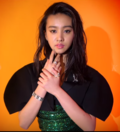Search results
Appearance
There is a page named "Shizuka Miura" on Wikipedia
- Shizuka Miura (三浦 静香, Miura Shizuka, IPA: [ɕizɯᵝka̠ mʲiɯ̟ᵝɾa̠]; 7 March 1962 – 31 January 2010) was a Japanese ball-jointed doll maker, singer, songwriter...10 KB (1,101 words) - 22:43, 13 March 2024
- In 1992, Shizuka Miura (vocals and rhythm guitar) began composing music and performing by herself, but she soon formed a duo with Maki Miura (lead guitar)...39 KB (4,322 words) - 22:39, 13 March 2024
- politician Shizuka Kudō (静香, born 1970), Japanese singer Shizuka Miura (静香, died 2010), Japanese ball-jointed doll maker and musician Shizuka Nakamura (中村...4 KB (497 words) - 17:16, 19 May 2024
- Creamy Mami, the Magic Angel). Miura penned songs for Yōko Oginome, Yu Hayami, Hiromi Go, Seiko Matsuda, Miki Matsubara, Shizuka Kudo, Kenji Sawada and Yoshie...3 KB (223 words) - 06:25, 8 June 2024
- Shizuka Itō (伊藤 静, Itō Shizuka, born December 5, 1980) is a Japanese voice actress and singer from Tokyo, Japan. She is represented by Ken Production....60 KB (3,272 words) - 10:24, 21 June 2024
- "Shizuka Miura". The Wire. ISSN 0952-0686. Wikidata Q105485575. Archived from the original on 6 May 2018. Mason Jones (15 February 2010). "Shizuka R...242 KB (11,227 words) - 01:19, 3 July 2024
- "Shizuka Miura". The Wire. ISSN 0952-0686. Wikidata Q105485575. Archived from the original on May 6, 2018. Mason Jones (February 15, 2010). "Shizuka R...546 KB (45,087 words) - 08:02, 3 July 2024
- Shizuka Hasegawa (長谷川 静香, Hasegawa Shizuka, born September 16, 1988) is a Japanese voice actress from Tokyo, Japan. She appears as a main cast member in...3 KB (250 words) - 18:04, 4 May 2024
- Tomokazu Miura (三浦 友和, Miura Tomokazu, born Miura Minoru (三浦 稔) on January 28, 1952) is a Japanese actor. Miura attended Hino high school in Tokyo. He...12 KB (728 words) - 00:18, 18 May 2024
- on February 5, 2003, in Tokyo, Japan to actor Takuya Kimura and singer Shizuka Kudo. She had taken lessons in piano and flute, and won the Excellence...13 KB (891 words) - 10:15, 24 June 2024
- List of Bakuman characters (section Goro Miura)often expresses his frustration towards Miura when the two groups share the same editor. Ryu Shizuka (静河 流, Shizuka Ryū) is an 18-year-old newcomer manga...38 KB (5,624 words) - 16:38, 3 May 2024
- Tomás Eloy Martínez, 75, Argentine writer and journalist, brain tumor. Shizuka Miura, Japanese ball-jointed doll maker and musician, suicide. John Norris...155 KB (10,932 words) - 20:00, 27 June 2024
- appearances in at least three video footages. Shizuka Miura 天界のペルソナ (in Japanese), Performer: Shizuka, Japan, 22 September 1994, ASIN B00005IHHF,...8 KB (495 words) - 18:07, 17 February 2024
- Berserk is a Japanese manga series written and drawn by Kentaro Miura, and has been published by Hakusensha in the magazines Monthly Animal House (1989–1992)...89 KB (2,335 words) - 02:55, 20 May 2024
- hypnotized, Shizuka Suzuki sings and dances every time she hears music. She tries to find her hypnotizer to break the curse. Ayaka Miyoshi as Shizuka Suzuki...2 KB (150 words) - 08:57, 11 January 2023
- "Please" is a song recorded by Japanese singer Shizuka Kudo. It was originally intended to be included on Kudo's sixth studio album, Mind Universe, but...5 KB (298 words) - 17:53, 29 November 2023
- Herself NHK E-TV Variety show regular; as part of Suiensā Girls 2010 Soil Shizuka Miura Wowow 2010 Ryōmaden Nakazawa Mitsue NHK 2011 Nyanpire Mori-kun, Komori-kun...9 KB (466 words) - 06:02, 8 June 2024
- Yoshio Harada as Ryūji Takayama Ayane Miura as Sadako Yamamura Kyōko Dōnowaki as Shizuko Yamamura Mai Tachihara as Shizuka Asakawa Akiko Hinagata as Tomoko...4 KB (242 words) - 21:20, 11 March 2024
- as Emperor Sanjō, the 67th emperor Sakura Inoue as Fujiwara no Yoshiko Shizuka Nakamura as Fujiwara no Nobuko Seia Yasuda as Fujiwara no Motoko Aki Asakura...9 KB (645 words) - 09:21, 1 July 2024
- Shizuka Ishibashi (石橋 静河, Ishibashi Shizuka, born July 8, 1994) is a Japanese actress. She is represented by the talent agency Plage. Ishibashi was born...15 KB (1,077 words) - 09:11, 18 October 2023




